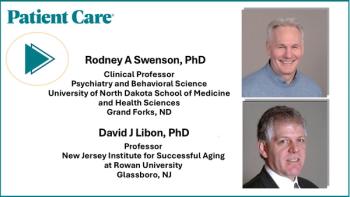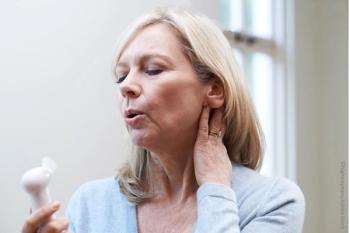
If primary care clinicians are to meet the cognitive screening demands that are growing with an aging population, they need the sharpest tools in the box, this expert says.

If primary care clinicians are to meet the cognitive screening demands that are growing with an aging population, they need the sharpest tools in the box, this expert says.

Bayer's elinzanetant, a potential nonhormonal treatment for menopausal symptoms, awaits FDA approval after a 90-day review extension.

ADA 2025: Dapiglutide showed promising safety and weight loss results in a phase 1b trial, targeting obesity and inflammation with once-weekly dosing.

RAD 2025: Multidisciplinary collaboration at disease-specific meetings drives clinical and therapeutic progress in AD, Dr Yu told Patient Care.

Dermatologists aren't trained in mental health but once in practice they need to have a deep appreciation for the emotional impact of diseases like AD and a low bar for mental health referral.

At RAD 2025, Dr Yu shared hopes for more real-world data and targeted treatment approaches for chronic hand eczema.

RAD 2025: Yale dermatologist Mona Shahriari, MD, urged primary care clinicians to refer patients with AD who don't improve to prevent cumulative emotional burden.

RAD 2025: Expert insights on the psychosocial burden of AD, flexible dosing, and cross-specialty collaboration in pediatric care.

RAD 2025: Johann Gudjonsson, MD, PhD, on investigational AD treatments, including anti–IL-31 receptor antibodies, anti–IL-13 treatments, IL-4 receptor blockers, JAK inhibitors, and new topical agents.

RAD 2025: Brad Glick, DO, MPH, discusses the intensity of TSW symptoms and cautions against assuming there is mental health disturbance at work.

Johann Gudjonsson, MD, discusses how OX-40/OX-40L signaling drives immune activation in AD and its emerging role as a genetic and therapeutic target.

The literature on topical steroid withdrawal syndrome is scant, Glick says; we're learning more about it, but we need more research to help our patients.

RAD 2025: Peter Lio, MD, discussed the benefits of disease-specific meetings, the evolving AD landscape, and why continuity across sessions enhances clinician education.

RAD 2025: Glick spoke to Patient Care about the similarities between TSW and a flare of atopic dermatitis as well as specific signs now being identified d as characteristic.

At RAD 2025, pediatric dermatologist Elizabeth Swanson, MD, discussed the value of focused AD education and anticipated label expansions for several treatments.

RAD 2025: Renowned AD investigator Kircik provides the history behind the classwide black box warning, highlights JAK inhibitor efficacy, and toplines exciting AD research.

At RAD 2025, Johann Gudjonsson, MD, PhD, discussed the OX-40 pathway’s role in AD, genetic links to disease risk, and promising combination therapies in development.

RAD 2025: Chovatiya toplines shifts in dosing strategies for topical, oral, and injectable AD therapy observed in both clinical trials and clinical practice.

RAD 2025. Peter Lio, MD, shares details from his presentation on shared decision making when treating children with atopic dermatitis.

RAD 2025. Lebrikizumab improved skin clearance, itch, and pigmentation in patients with skin of color and atopic dermatitis, with strong safety data through 24 weeks, according to late-breaking data.

RAD 2025: Chovatiya spoke at RAD about the need to better understand how treatments for AD are being used in the real world, after symptoms subside and skin signs clear.

RAD 2025: Jiade Yu, MD, discussed chronic hand eczema as a distinct condition from AD, highlighting its clinical burden and emerging treatments, such as delgocitinib.

From primary care management of heavy menstrual bleeding to postpartum depression screening, find out what you may have missed at ACOG 2025.

Clinicians learn to recognize the hidden psychosocial burdens of atopic dermatitis, emphasizing comprehensive care beyond skin symptoms for better patient outcomes.

RAD 2025: Explore expert insights on chronic hand eczema, its differences from atopic dermatitis, and emerging treatments in this informative video series.

RAD 2025: Many adults achieved optimal treatment targets with upadacitinib after 6 months, regardless of prior biologic therapy, according to new late-breaking data.

RAD 2025: World expert on the pathophysiology of itch Gil Yosipovitch, MD, answers questions on the disease of chronic itch and on the expanding options for targeted treatment.

RAD 2025: Lisa Swanson, MD, shares insights on pediatric atopic dermatitis, addressing questions from both a dermatologist's and an allergist's perspective.

RAD 2025: Mobile health data reveal a troubling decline in systemic treatment for moderate to severe atopic dermatitis, underscoring issues in access and clinical inertia.

Dupilumab monotherapy showed significant improvements in atopic dermatitis symptoms in patients with skin of color, according to late-breaking data presented at RAD 2025.